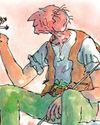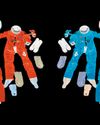
Should anyone doubt the importance of libraries, Shehan Karunatilaka is living proof that they can, in fact, change lives.
As a teenager living in Whanganui, Karunatilaka spent so many hours in his school library that it inspired him to take up writing as a career. And as we all now know, that was no folly.
At the end of last year, his second novel, The Seven Moons of Maali Almeida, won the Booker Prize. He is the first Sri Lankan novelist to win the Booker since Michael Ondaatje won in 1992 for his sweeping epic The English Patient.
Born in Galle, Sri Lanka, in 1975, Karunatilaka moved with his family to New Zealand in 1990 when he was 15. His doctor father took up a post at Whanganui Hospital, which was then experiencing a doctor shortage. Karunatilaka was sent to board at Whanganui Collegiate.
"And, of course, I hated the whole experience," he says. "It's different when you're one of the few brown kids at boarding school wearing a uniform. Even though my country was messed up, I didn't want to leave my friends and go to Whanganui." To alleviate the huge upheaval and displacement, Karunatilaka found refuge in books in the school library. "It was probably what made me want to be a writer, all those hours I spent at that library."
Karunatilaka went on to study at Massey University in Palmerston North before living in Wellington, then going on to live and work (mostly in advertising and copywriting) in London, Amsterdam and Singapore. He now lives in the Sri Lankan city of Colombo with his wife and their two young children.
Denne historien er fra April 01-07 2023-utgaven av New Zealand Listener.
Start din 7-dagers gratis prøveperiode på Magzter GOLD for å få tilgang til tusenvis av utvalgte premiumhistorier og 9000+ magasiner og aviser.
Allerede abonnent ? Logg på
Denne historien er fra April 01-07 2023-utgaven av New Zealand Listener.
Start din 7-dagers gratis prøveperiode på Magzter GOLD for å få tilgang til tusenvis av utvalgte premiumhistorier og 9000+ magasiner og aviser.
Allerede abonnent? Logg på

Sights to behold
Being blind didn't deter Aucklander FRASER ALEXANDER and his partially-sighted wife from travelling in Europe. Their memories were shaped by sound, touch and smell.

Pages of delight
Charming survey of children's literature throughout the centuries should be treasured and reread.

Heart of the matter
Women are less likely to be diagnosed with heart disease than men, and less likely to get best treatment. Researchers are struggling with old stereotypes to right the balance.

Balaclava beats
Their paramilitary shtick is intentionally menacing, offensive and alienating, but to be fair to the hip-hop trio Kneecap, their infamous balaclava is disarmingly hilarious. Kneecap, the 2024 movie that offers a fictionalised account of their rise to fame, is a Bafta- and Oscar-nominated Northern Irish film sensation.

Friends like these
One of the stranger characteristics of the populist oligarchy mobilising around Donald Trump's new administration is the interest taken in the domestic politics of the UK.

Irresistible force
A new documentary about gentle rugby giant Jonah Lomu reveals little but is a reminder of what made him special.

Fleeing the nest
A tale of building a new life after an abusive relationship makes for an impressive debut.

Life less ordinary
Chelsie Preston Crayford follows a big 2024 with a new comedy role and putting the finishing touches on her debut feature as a director and writer.

Not on our watch
Nasa, one of the most technologically advanced organisations on the planet, made prospective astronauts take inkblot tests to determine their sexuality.

No free lunch
The new, cut-price school lunch programme will shut out many community providers. But will bulk-supplied meals meet children’s needs?